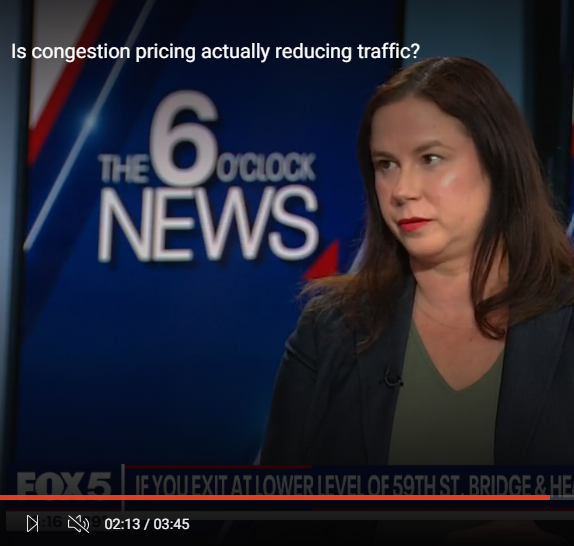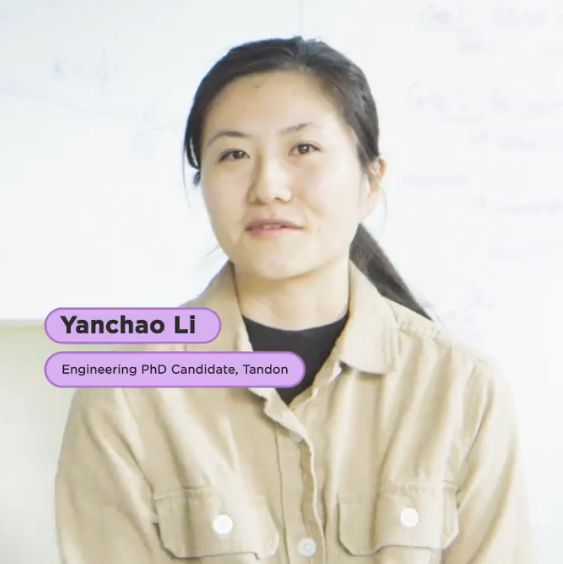Welcome to the C2SMARTER Congestion Pricing Dashboard!
This interactive data dashboard integrates various public data sources to track the impacts of congestion pricing on the New York City region’s transportation system. It will update regularly and continue to evolve with the addition of new data, impact metrics, and visualizations.
Dashboards
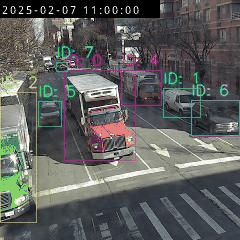
C2SMARTER Multimodal Density Tracker
This visualization leverages public traffic camera (CCTV) snapshots using advanced computer vision techniques. Comparing weekly density data from 2024 and 2025, we analyze travel pattern changes across modes (vehicles, trucks, pedestrians, and cyclists). Density refers to the average number of road users visible in individual camera snapshots collected every 30 minutes, indicating how crowded a road segment appears at a given time.
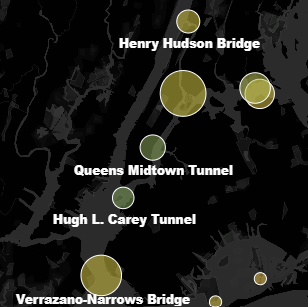
MTA Crossing Volumes
MTA tracks the number of vehicles that pass through its nine bridges and tunnels. This visualization shows year-over-year changes at these facilities, including two that connect directly to the congestion pricing zone, the Hugh Carey and Queens-Midtown tunnels.
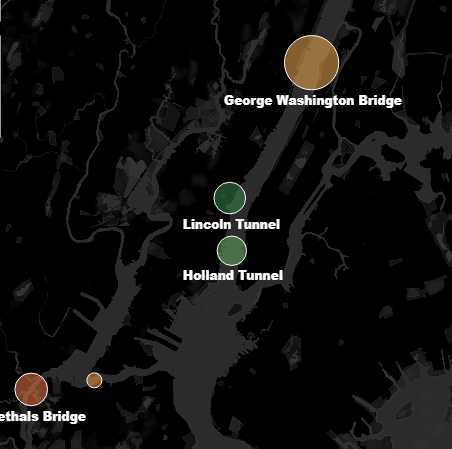
PANYNJ Crossing Volumes
Port Authority of New York & New Jersey (PANYNJ) tracks the number of vehicles that pass through its bridges and tunnels. This visualization shows year-over-year changes at these facilities, including two that connect directly to the congestion pricing zone, the Lincoln and Holland tunnels.
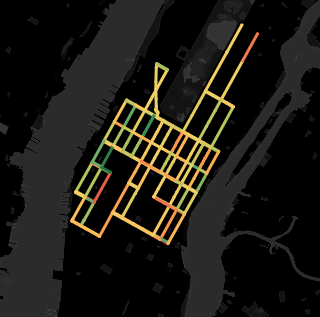
Vehicle Speeds
Using data from Midtown in Motion, this visualization depicts year-over-year hourly traffic speed changes in Manhattan before and after congestion pricing, specifically the area between 57th and 14th streets.
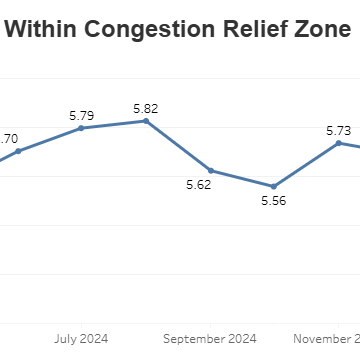
MTA Bus Speeds
This visualization depicts average monthly MTA bus speeds by route. It can be filtered by routes that are fully within, partially within, or outside of the congestion pricing zone, as well as by service type and time of day.
About
Congestion pricing kicked off in New York City on January 5, 2025. As part of this first in the nation program, vehicles are tolled when entering the Congestion Relief Zone — local roads south of 60th Street in Manhattan. Congestion pricing is expected to reduce traffic, improve air quality, and generate revenue to fund critical transit infrastructure. As the only U.S. DOT University Transportation Center in the focus area of Reducing Congestion, C2SMARTER is closely monitoring the impacts of this effort. C2SMARTER researchers are collecting and analyzing data to better understand the impacts of the program on traffic and transportation in and around New York City. Congestion pricing is decades in the making for New York; as the implementing entity, the Metropolitan Transportation Authority (MTA) joins the ranks of its international counterparts including Singapore, London, Stockholm, and Milan in implementing a downtown pricing scheme. Information about the tolling structure, discounts, and exemptions, as well as FAQs, can be found on the MTA’s website.
Impacts
As part of its obligations under the program’s federally mandated Environmental Assessment, the MTA will be monitoring and reporting on congestion pricing’s impacts, including metrics such as air quality and emissions trends, project revenue, etc. C2SMARTER’s all-in-one data dashboard aims to augment MTA’s required reporting, providing timely data and a comprehensive picture of congestion pricing impacts over time. In addition to consolidating public data on transit and traffic collected and published by the MTA and city agencies such as the Department of Transportation (NYCDOT), C2SMARTER researchers have conducted unique analyses using computer vision and other AI-enabled techniques to better understand the temporal and spatial implications of congestion pricing.
C2SMARTER Research
Untangling Heterogeneous Passenger and Freight Policy and Program Causal Contributions with Data-Driven Time-of-Day Monitoring and Evaluation Frameworks. As part of work funded by the SEMPACT UTC, this project will create a transportation intervention evaluation framework that quantifies data related to congestion pricing.
Integrating Personalized Incentives and Virtual Reality Tools for Enhanced Transportation System Management. This project in collaboration with North Carolina Agricultural and Technical State University (NCA&T) and industry collaborator Metropia will examine impacts of carpooling incentives in NYC during the congestion pricing era.
What is the New Baseline: Helping FDNY Understand Emergency Response Needs. Our work with FDNY will consider how the agency’s operating conditions may change as a result of congestion pricing.
C2SMARTER’s multi-agent simulation test bed, MATSim-NYC, evaluated congestion pricing scenarios, quantifying the impacts to travelers and showing how they differ between Manhattan residents and others.
He, B.Y., Zhou, J., Ma, Z., Wang, D., Sha, D., Lee, M., Chow, J.Y. and Ozbay, K., 2021. A validated multi-agent simulation test bed to evaluate congestion pricing policies on population segments by time-of-day in New York City. Transport Policy, 101, pp.145-161.
C2SMARTER researchers used data from Replica to assess congestion pricing impacts on different groups of NYS residents that travel to lower Manhattan.
Ren, X., & Chow, J. Y. (2023). Nonparametric estimation of k-modal taste heterogeneity for group level agent-based mixed logit. arXiv preprint. https://arxiv.org/abs/2309.13159
Disclaimer
The data presented in this dashboard is based on open data feeds and is provided for informative purposes only. C2SMARTER assumes no responsibility or liability for any errors or omissions. Official data on the impacts of congestion pricing are provided by public agencies.For questions or to request data files or reposting of data created by C2SMARTER, please contact us (c2smarter@nyu.edu).

